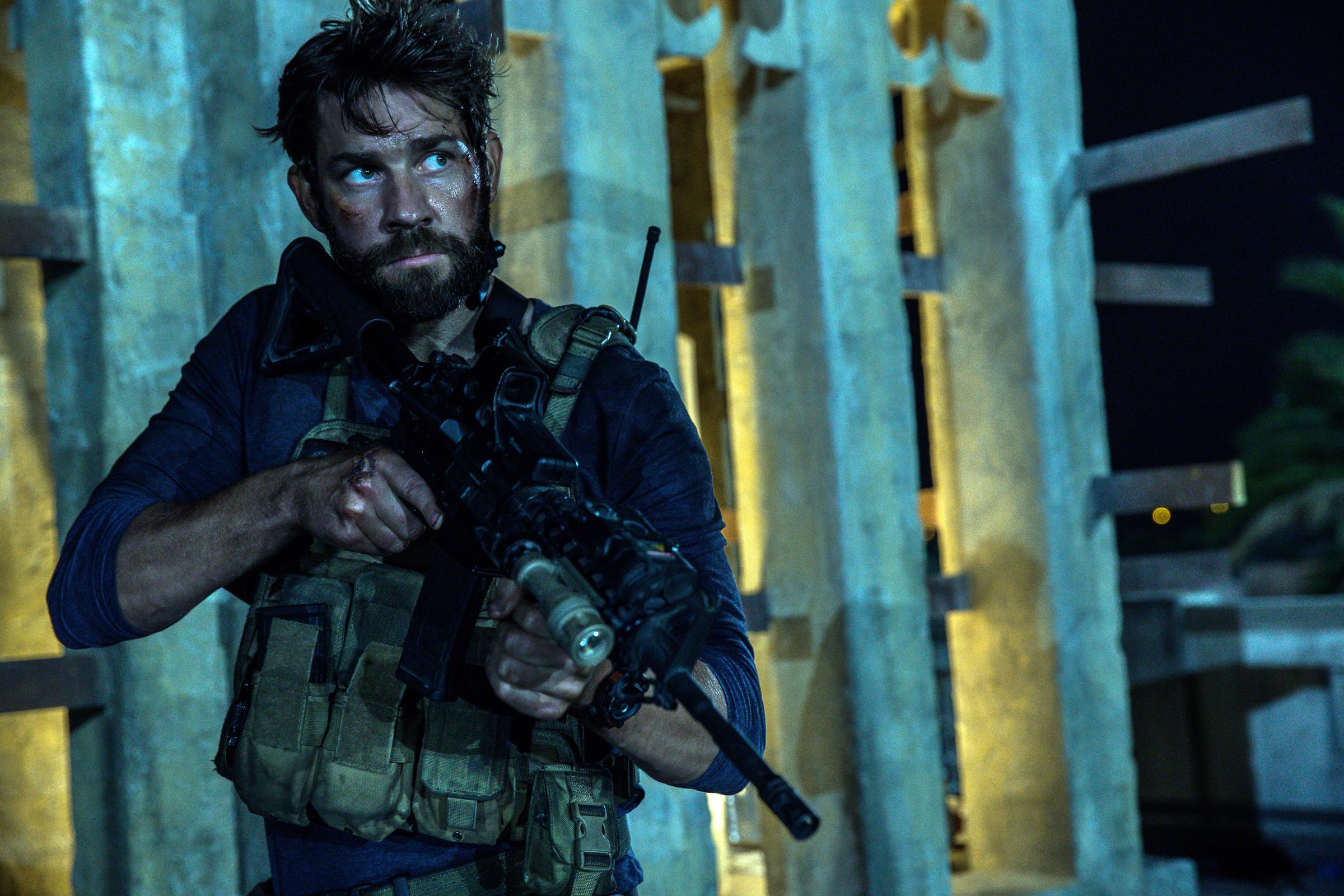
It’s hard to know just what to make of Michael Bay’s 13 Hours: The Secret Soldiers of Benghazi. It’s harder yet to figure out why it even exists, or whom it exists for. The picture, based on Mitchell Zuckoff’s book, aims to dramatize the Sept. 11, 2012 attacks on two U.S. diplomatic compounds in Benghazi, Libya, carried out by Islamist militants. Four Americans, including U.S. Ambassador Christopher Stevens, were killed; 10 others were injured. 13 Hours tells the story from the point of view of a six-man security team that first tried to rescue Ambassador Stevens after the terrorists attacked the main compound, and later attempted to stave off the militants’ assault on a CIA annex about a mile away.
13 Hours is bloody, graphic and intense, effective in a blunt-trauma way. But while the movie isn’t overtly political in a the partisan sense—it comes with no “Blame Hillary” agenda attached—there is something unscrupulous about the way it interprets and presents a real-life tragedy for the delectation of movie audiences. The picture isn’t exactly informative—Bay doesn’t explain very clearly exactly what happened, probably because nobody has a completely clear picture of the incident, not even those who were directly involved. But 13 Hours comes so close to being action entertainment that it made me a little queasy. It’s violent, but also weirdly detached from all-too-recent history. You could easily imagine someone adapting a video game from it, if someone isn’t at work on one already.
John Krasinski and James Badge Dale play Jack Silva and Tyrone “Rone” Woods, two members of that elite ex-military team, close friends who both have families but nevertheless keep allowing themselves to be drawn back to dangerous assignments. Jack has a wife and two girls back home; Rone has left a wife and an infant, the latter appearing, in all his chubby-cheeked glory, in a snapshot that will later prove extremely significant—you can bet Bay, with his tendency toward emotional bombast and visual overkill, will get his meaty paws all over it. The other men on the team include Dave “Boon” Benton (David Denman) and John “Tig” Tiegen (Dominic Fumusa), though it’s a bit of a challenge to tell all of these dudes apart: with their brawny shoulders and regulation-style beards, each of them looks like the guy you cast when you can’t get Bradley Cooper.
The first half-hour or so of 13 Hours captures the ennui of guys sitting around waiting for stuff to happen, even as they’re hoping against hope that nothing will happen. And once the attacks begin, they’re terrifying: At one point Ambassador Stevens (Matt Letscher) huddles in a small, closed room as the militants light a fire right outside—black smoke flows beneath the door, rolling out in fat, fluffy plumes so beautiful that you momentarily forget how deadly they are. Later, grisly chaos erupts when the security team, perched on the roof of the CIA annex, the better to defend it, are blasted by artillery fire and grenades. Earlier, we’ve seen Rone slip that picture of his pudgy-cute baby beneath his vest. When he’s hit—a strike he doesn’t survive—Bay can’t resist showing smoke and detritus floating about, including the baby photo wafting gently down to Earth.
When I saw that snapshot, drifting along so artistically, I yelled out loud at the screen. I would have thrown a tomato—or a grenade—if I’d had one. All movies constitute emotional manipulation of some sort. But Bay (here working with cinematographer Dion Beebe and the usual army of special-effects guys) just goes for the cheapest shot without even thinking twice. It all makes you feel a little dirty as a spectator.
Even as Bay purports to show us how horrible this type of warfare is, he also can’t resist making it look at least a little exciting, like a not-so-thinly veiled recruitment ad. The movie insists on revving you up no matter how resistant to revving you are. As we know from Armageddon, Pearl Harbor and those million-and-one (or is it a million-and-two?) Transformer movies, Bay, among the most ham-fisted of directors, loves nothing more than things that go “boom.” But he’s almost worse when he’s trying to be sensitive and fair. Near the end of 13 Hours, there’s a sequence in which the mothers and wives of the militants, wrapped in their chadors, descend upon a lot in which their fallen men lie, clearly grieving. It’s not that this isn’t a realistic (or compassionate) depiction of what must have actually happened. It’s just that after all that carnage, it reads as a false moment of healing, a pre-emptive jab at critics who might call 13 Hours a jingoistic hootenanny. But I’m not so sure it isn’t a jingoistic hootenanny. One of the final shots includes a tattered, torn and dirtied American flag; earlier, we’d seen the militants shooting holes in Old Glory, presumably the same one. The bastards! Let’s get ’em! There are moments when 13 Hours: The Secret Soldiers of Benghazi works like gangbusters. Still, it’s best to proceed with caution—and to know you’re being worked on.
More Must-Reads from TIME
- Cybersecurity Experts Are Sounding the Alarm on DOGE
- Meet the 2025 Women of the Year
- The Harsh Truth About Disability Inclusion
- Why Do More Young Adults Have Cancer?
- Colman Domingo Leads With Radical Love
- How to Get Better at Doing Things Alone
- Michelle Zauner Stares Down the Darkness
Contact us at letters@time.com